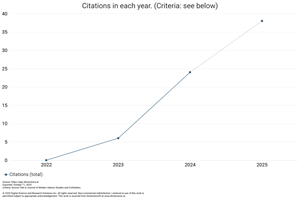Citizenship in Islam: View of Imam Al-Ghazali
DOI:
https://doi.org/10.59653/jmisc.v1i02.289Keywords:
Citizenship, Islamic, Al-GhazaliAbstract
As the role and function of the nation-state continue to expand, citizenship in the contemporary context has also developed. Islamic thoughts about being part of the political community, territory, and government system are all included in the data sources of the Al Quran and hadith. This study aims to discuss citizenship in Islam: the views of Imam Al-Ghazali. In this paper, researchers used the literature study method. In collecting data, the researcher uses literary research methods. This research was conducted by browsing and viewing literature and research related to library materials. These study results are related to the concept of citizenship in the analysis of Al-Ghazali's study, which is immovable in politics and law. A country must have a forward orientation and not continue with its dark past. A country and a government must organize themselves both from good citizens and a just government to achieve goals that are shared.
Downloads
References
Al-Ghanimi, Abu al-Wafa al-taftazani. (1997). Sufis from age to age (A. Rifa'i, Trans.). Bandung: Student Library.
Al-Ghazali, Hamid. (1958). Tahafut al-Falasifah (S. Dunya, Ed.). Cairo: Dar al-Ma'arif.
Al-Ghazali. (n.d.). Iqtisad fi al-I'tiqdt (95). Cairo: At-Tij ^ iya.
Al-Ghazali. (1964). Nasihat al-Muluk (FR. C. Bagley, Trans.). London: Oxford University Press.
al-Mawardi. (1909/1328 H). al-Ahkdm al-Sultdniyah. Misr: alSa'adah.
Al-Quran Translation. (2015). (RI Department of Religion, Trans.). Bandung: CV Darus. Sunnah.
Ann K. S. Lambton. (1954). The theory of kingship in the NasThat al-Muluk of Ghazali. Islamic Quarterly, 1(1), 37-54.
Artik Wartini. (2015). Education character in view of Al-Ghazali and its relevance with the education character in Indonesia. Ta'dib, 20(2), 135-144.
Erwin I. J. Rosenthal. (1962). Political thought in medieval Islam: An introductory outline. Cambridge University Press.
Euis Amalia. (2007). The history of Islamic economic thought from classical to contemporary periods. Jakarta: Pusaka Asatruss.
Hanafi, A. (1976). Islamic philosophy. Bandung: Moon Star.
Khoriddin Nasution. (1994). Al Ghazali and his theory of government. UNISIA, 24(4), 37-54.
Leonard Binder. (1955). Al-Ghazali's theory of Islamic government. The Muslim World, 45(3), 177-190.
Lewis, B. (1988). The political language of Islam. Chicago: University of Chicago Press.
Mohammad Hashim Kamali. (2009). Citizenship: an Islamic perspective. Journal of Islamic Law and Culture, 11(2), 151-171.
Montgomery Watt, W. (1990). The glory of Islam (trans.). Yogyakarta: Tiara Wacana.
Nawaf Salam. (1997). The emergence of citizenship in Islamdom. Quaterly Arabic Laws, 12(2), 125-126.
Sulaiman, Fahtiyyah al-Hasan. (1986). The concept of Al-Ghazali education (A. Hakim & M. I. Aziz, Trans.). Jakarta: Pesantren and Community Development Association (P3M).
Topcuoglu, AA. (2012). Modern hukuk ve Islam'da vatandaslik kavraminin hukuki temeli. Gazi Üniversitesi Hukuk Fakültesi Dergisi, 16(3), 609-636.
Uup Gufron. (2015). The concept of good governance in Al-Ghazali's view. Journal of Bimas Islam, 8(4), 773-801.
Wahyu Dwi Yulianto & Laela Al Mubarokah. (2017). Students' moral problem based on teacher's perspective: Imam Al Ghazali's concept. PEOPLE: International Journal of Social Sciences, 6(1), 111-120.
Downloads
Published
How to Cite
Issue
Section
License
Copyright (c) 2023 Yudi Krisno Wicaksono, Abd. Aziz

This work is licensed under a Creative Commons Attribution-ShareAlike 4.0 International License.
Authors who publish with this journal agree to the following terms:
- Authors retain copyright and grant the journal right of first publication with the work simultaneously licensed under a Creative Commons Attribution-ShareAlike that allows others to share the work with an acknowledgement of the work's authorship and initial publication in this journal.
- Authors are able to enter into separate, additional contractual arrangements for the non-exclusive distribution of the journal's published version of the work (e.g., post it to an institutional repository or publish it in a book), with an acknowledgement of its initial publication in this journal.
- Authors are permitted and encouraged to post their work online (e.g., in institutional repositories or on their website) prior to and during the submission process, as it can lead to productive exchanges, as well as earlier and greater citation of published work (See The Effect of Open Access).
























